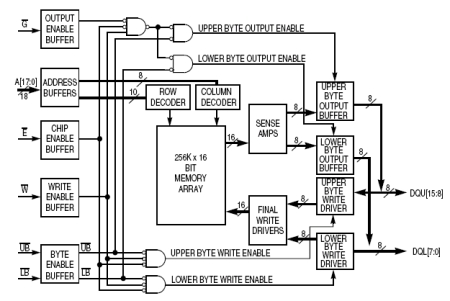Magnetic memory to replace flash?
Jul 10, 2006 — by LinuxDevices Staff — from the LinuxDevices Archive — 10 views Freescale is shipping what is claimed to be the first commercial Magnetoresistive Random Access Memory (MRAM) chip. MRAM, which combines magnetic materials with conventional silicon circuitry, can deliver RAM-like speeds, flash-like nonvolatility, and unlimited “endurance,” according to the company.
Freescale is shipping what is claimed to be the first commercial Magnetoresistive Random Access Memory (MRAM) chip. MRAM, which combines magnetic materials with conventional silicon circuitry, can deliver RAM-like speeds, flash-like nonvolatility, and unlimited “endurance,” according to the company.
(Click here for larger view of the MR2A16A die)
In contrast to conventional flash EPROM technology, MRAMs offer unlimited rewritability, a characteristic known as “endurance.” Due to their limited endurance capabilities, flash memory chips require complex “wear leveling” algorithms, which are generally implemented within a device's flash filesystem software. Such precautions are unnecessary with MRAM, however.
Additionally, unlike flash memory, MRAM offers fast read/write cycle times — currently 35 nanoseconds. Hence, MRAM chips can be used to implement nonvolatile cache memory, potentially resulting in more reliable computers. Overall, MRAM is expected to enable “new classes of electronic products offering dramatic advances in size, cost, power consumption, and system performance,” Freescale says.
Freescale's MRAM technology is protected by over 100 patents, including “toggle-bit switching,” according to the company.
The MR2A16A
The first commercial MRAM chip is a modest one, offering just four megabits (Mbits) of data storage and intended to replace typical battery-backed SRAMs. The MR2A16A supports a commercial temperature range, and is a 3.3 volt device with 35 nanosecond read and write cycle times. It is an asynchronous memory organized as 256K words by 16 bits.

MR2A16A block diagram
(Click image to enlarge)
The chip implements standard SRAM pinout, is housed in a 400 mil TSOP type-II RoHS package, and is manufactured at Freescale's 200 millimeter Chandler Fab in Arizona.
The MR2A16A is expected to be used in networking, security, data storage, gaming, and printer applications. Other uses might include “cache buffers, configuration storage memories, and other applications that require the speed, endurance and non-volatility of MRAM,” according to the company.
Availability
The MR2A16A MRAM is available now from Freescale.
This article was originally published on LinuxDevices.com and has been donated to the open source community by QuinStreet Inc. Please visit LinuxToday.com for up-to-date news and articles about Linux and open source.